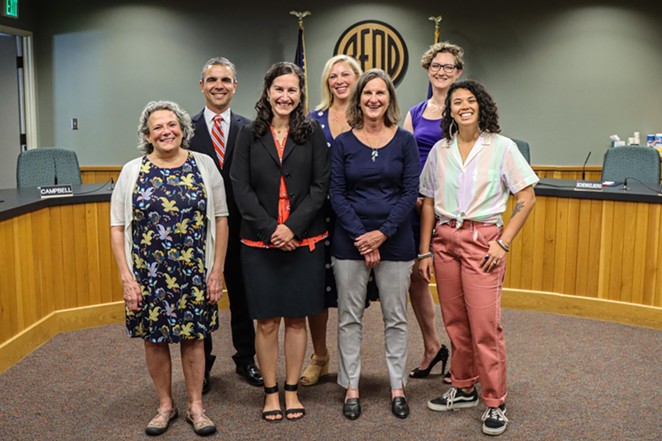Last week, locals saw the first in what will most likely be a number of filings for the mayor's race in Bend. Former City Councilor Chris Piper's announcement that he's running to be Bend's next mayor brought on a flurry of commentary from the local Twitterverse. Blue-leaning politicians and local political pundits bagged on Piper for being a former political appointee who, after failing to win over Bend voters to become a democratically elected city councilor during the 2020 election, now is trying to move a notch higher on the food chain and become mayor.
Others postulated about whether current City Councilor Melanie Kebler would also decide to run for mayor—postulations that have the appearance of a coordinated effort to build buzz around Kebler eventually announcing her candidacy. The mayoral position is Position 7 in Bend; if you're a sitting councilor and want to run for it, you have to leave your current seat—in Kebler's case, Position 1—to sit in it. Ironically, should she or any other sitting councilor with more time in their term win that election, the Council would need to fill the seat they would be vacating, creating another appointment scenario.
According to Bend's city charter, "A vacancy in the council shall be filled within 30 days by appointment by the council. If the council does not fill the vacancy by an appointment within 30 days, then the vacancy shall be filled at the next available election as provided by state law."
Allowing for people to be appointed to vacant seats is embedded into Bend's charter—a document that only changes by the will of the voters. While Piper's appointment came with a lot of outcry over the fact that he was ultimately chosen over a woman of color (who appeared to be the top choice until the very end of the process), that questionable back-room decision can hardly be laid at Piper's feet.
Still, in a time when voting and elections are being called into question, often needlessly, it is time to review this most un-democratic part of our electoral process— the position appointment. This part of our governmental process happens far more often than we as an editorial board feel comfortable with. We can call on our legislatures and the U.S. Congress to make voting more free and open and fair and secure all we want—but that will not erase the fact that plenty of officials in elected positions got into their seats without taking part in the process at all.
For example, in Deschutes County, former County Clerk Nancy Blankenship decided to retire from her elected position last year, ahead of the end of her term, and appointed Steven Dennison to replace her. The county clerk, as a reminder, is the official who administers elections. While Dennison is by all evidence a responsible and principled person who served under Blankenship for years before the appointment, seeing him appointed rather than elected can sow a seed of mistrust.
Piper's appointment, judging by the response to his mayoral announcement, also sowed doubt that garnered far more commentary than any position he took as a councilor. If Kebler should run and the council is required to appoint another councilor to fill her seat, that appointment could also repeat this same dissatisfaction.
Where does it end? How can we move toward building more trust in government and elections with this glaring hole in the process? One could argue that the people appointing the appointees were elected. Therefore, by their election, we are putting our faith and trust in them to make decisions like these. In the case of a prospective opening on the Bend City Council, should the City Council fail to appoint someone in time, seeing the seat remain open comes at a cost: a long-open seat, the lack of a tie-breaking vote on the council and also the costs of running an election. Still, not appointing people to elected positions spares the electorate and the candidate from awkward relationships.
Political appointees could well be the very best of us, appointed by people who understand the background and wherewithal needed for a particular position. Other times, appointees get in by way of political pressure exerted on elected officials by those who opt to pull on the levers of power away from the public eye. Determining which one is which is perhaps the biggest hole in our otherwise-democratic system.





















